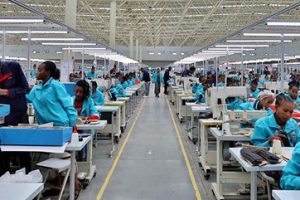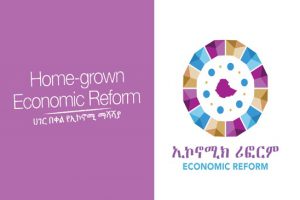
The recent visit to China by a highlevel Ethiopian delegation led by PM Abiy has attracted considerable media attention last week as the issue was seen from the domestic as well as the international perspectives. From the domestic perspective, the prime minister’s visit to China was bound to elicit mixed reactions.
Some quarters looked at it with caution while others, particularly those sympathetic to the current reformist Ethiopia government with favorable eyes. However, a balanced perspective should be articulated by looking at the pros and cons of the two positions and what might be good for Ethiopia that is currently going through a recession-like cooling down of the economy.
In just 30 years China has made a quantum leap from being a developing country that could not adequately feed its fast growing population, to an economic superpower or the second world economic power after the United States. Some China analysts say that Beijing is going to outstrip the US economically in the coming couple of decades if all goes well and the high growth rate the country enjoyed in the past would be maintained in the near future.
Many China admirers call this the “Chinese miracle” that has inspired countries and leaders around the world, particularly in the developing countries. Now China is aiming to bring its miracle to the attention of the global audience. Last week’s meeting of some of the most prominent leaders from Africa and elsewhere around the world is the second of its kind and its chief objective was to sell the belt and road initiative to countries that have endorsed it unconditionally because most of them are going through deep economic troubles.
If we take Ethiopia for instance, Chinese economic largesse in the last decade or so has helped the country in the infrastructure sector in particular. Ethiopia has borrowed heavily from China to finance its projects and almost all the companies involved in these project are Chinese ones who brought with them not only their technology but also skilled and unskilled labor power that could otherwise be replaced by local manpower.
It is to be recalled that this had also drawn some public criticism that regard Chinese generosity with jaundiced eyes. Similar reactions were observed across the continent where Chinese economic strategy in Africa was the object of passionate debate in academic circles as well as in the streets. Despite what the public in Africa is saying, leaders converged in Beijing with much expectations because, as we said above, most of them, like Ethiopia or South Africa are in deep economic trouble.
The reform process in Ethiopia is threatened with general economic downturn while the financial sector with its serious hard currency crunch is perhaps the most to suffer. Balance of trade with China is obviously in favor of Beijing which is also providing the country with generous loans and debt cancellation. Ethiopia has not been able to pay back its debts to Beijing as scheduled and earned an important concession at the Beijing forum: the debts that should be paid within the last 10 years have been rescheduled for 30 years.
According to many observers, financial flows from China to Ethiopia might be used to alleviate some of the symptoms of the country’s deep structural problems but should not be taken as cure for the multifaceted problems it is juggling with at present. As Ethiopia’s past growth has been financed with Chinese capital in various forms it has given rise to what some critical observers call aid “dependent growth”, contrary to domestically generated growth. The danger of this kind of growth, the same observers maintain, is that Ethiopia’s economy is bound to face a mortal danger the moment Beijing puts a spigot on the money flow from one direction.
Others observers have a more optimistic view of Chinese lending to Ethiopia. As Beijing has launched its ambitious belt and road project, Ethiopia, which is a strategic country in Africa both diplomatically and economically, will not be abandoned by China because of the win-win scenario that might emerge from their bilateral relationships. Still others oppose this view by saying that China needs Ethiopia more than the latter needs it while the truth is that Ethiopia needs China more than Beijing needs it because of the looming economic troubles the new reformist administration continues to face rising economic problems like unemployment, food shortages and the internal displacement of millions of people.
Assistance from Western quarters like the World Bank and the European Union is regarded as qualitatively and quantitatively inadequate to meet Ethiopia’s urgent needs. In a way Ethiopia cannot be freed from Chinese aid because of the gravity of its economic challenges even if Beijing might not have hegemonic or “neo-colonialist” ambitions in Africa as it is often alleged by some critics. Aid or debt is like a quagmire as one critic noted, the deeper you go the more impossible it becomes to come out intact.
Chinese penetration into Africa was largely smooth until it now assumed a threatening dimension to Western interests in general and to US interests in particular. The trouble is that Washington woke up to Beijing’s economic power too late and long after the latter has been building it up in relative anonymity. That was why the results of Chinese “miraculous” rise were shocking to Washington. The Horn of Africa is increasingly becoming a bone of contention between Western and particularly American and Chinese and Russian interests on the other hand.
The bipolar world has been transformed into a multi-polar one with the US, the EU, China and Russia seeking their share of the pie in Africa in an increasingly polarized world. That is why Washington is increasingly becoming as the fiercest critic of China’s intrusions into Africa in particular. The Trump administration does not like Beijing’s involvement in the Horn of Africa because it considers Ethiopia’s its traditional and principal ally in the fight against terrorism in Africa.
Although much of Washington’s involvement is shrouded in secrecy, many Horn observers believe its relationship with Addis goes beyond common cause against terrorism and might involve American strategic interest with the wider Horn-Gulf-Arab and Red Sea geopolitical area known for its volatility and shifting alliances.
That is basically why Washington is sensitive to Chinese intrusion in Africa calling it in his tweet as “debt trap diplomacy” aimed at making Africa too dependent on Chinese money that the continent will not be able to pay soon and thus accept Beijing’s diktat in order to win debt cancellation and additional loans and assistance. If there is a point President Trump has overlooked, it is the fact that Western debt too had always been one of the traps into which African countries fell and made them wallow in poverty and dependency.
Alfred Romann, a writer for Al Jazeera wrote in one of his recent columns that at the Second Belt and Road Forum (SBRF) in Beijing, “Chinese President Xi Jinping “took pains to underscore the China’s good intentions and commitment to transparency and building a high quality, sustainable, risk-resistant, reasonably priced and inclusive infrastructure” Whether this line of reasoning is right or not, African countries need China now more than they need the US because of the former’s apparent largesse and the latter’s “America first” isolationist policy that has become the trademark of the Trump administration. China has allocated more than 500 billion dollars for the Belt and Road Initiative.
President Xi was quoted as saying that a total of 64 billion dollars were signed by the recent Beijing forum participants. This is a huge amount of money irresistible by more than 125 countries embraced in the BRI. There were also concerns of debt trap raised by the Chinese president at the Forum. He was noted as saying that corruption will be one of his top concerns as the BRI progresses in the coming years.
Critics argue that as China itself is from time to time hit by large scale corruption allegations, it is not clear how Xi is going to help fight corruption is such a huge global project as the BRI. There are already signs of concern among member countries of the BRI initiative as Malaysia reportedly cancelled some BRI projects while Turkey “skipped the forum citing fears of debt trap diplomacy” Africa in general and Ethiopia in particular have few options other than playing both the Western and Chinese balls, depending on the circumstances, even if they cannot play one against the other.
The BRI is a clear opportunity although skepticism is evident at this stage. However, it is not clear how strongly Washington would react to this latest Chinese global initiative that in the views of many Washington foreign policy insiders, may turn out to be a threat to US hegemony.
Nevertheless, this is not what concerns small developing countries at this stage. And rightly so because for them, securing debt cancellation, new loans and hard currency is much more an immediate existential opportunity than anything that might happen to BRI many decades from now.
The Ethiopian Herald, May 12/2019
BY MULUGETA GUDETA





